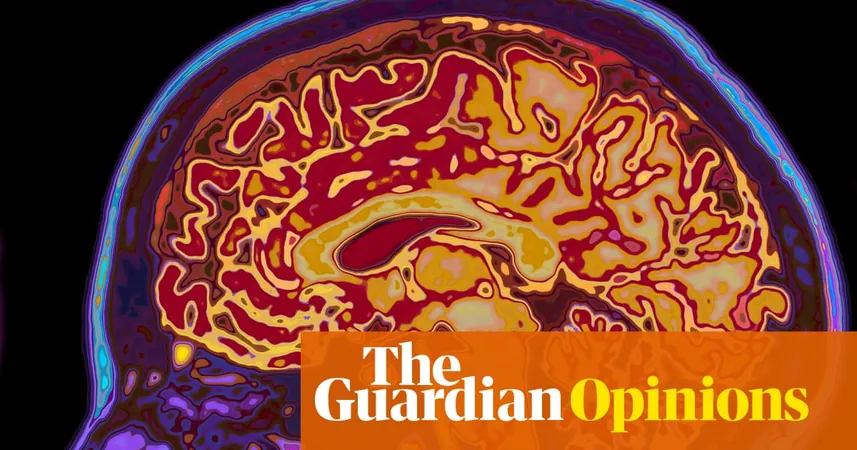
The Surprising Truth Behind the Looming Dementia Crisis: What You Must Know!
2025-04-08
Author: Amelia
The Emergence of Dementia as a Major Health Concern
In recent years, dementia has emerged as a major health concern, particularly in countries like Britain and the United States, where Alzheimer's and other dementias rank among the top causes of death. In the UK, these conditions overtook Covid-19 and heart disease as the leading cause of death in 2021. Dementia, encompassing various diseases that damage the brain and impair cognitive functions, poses a devastating reality for affected individuals and their families, leading to confusion, disorientation, and a loss of independence.
The Doomsday Forecasts of Rising Dementia Cases
Doomsday forecasts have projected an alarming increase in dementia cases, particularly as populations age. A groundbreaking study published in January 2025 in Nature Medicine analyzed 15,000 middle-aged Americans and revealed a shocking statistic: there is a 42% lifetime risk of developing dementia after the age of 55. This estimate suggests that the number of older Americans experiencing dementia is poised to double in the next four decades, reiterating the need for urgent public health strategies to tackle this looming crisis.
Emerging Hope: Declining Age-Specific Dementia Rates
However, amidst this narrative of an impending ‘dementia tsunami,’ a glimmer of hope has emerged. Recent data illustrates that, between 1984 and 2024, age-specific dementia rates have dropped by approximately two-thirds among US adults. Similar declines have been noted in Sweden, the Netherlands, the UK, and France. To clarify, while the sheer number of dementia cases is rising due to an aging population, the probability of developing dementia at any given age, regardless of whether it's 50, 60, or 70, appears to be decreasing. This suggests that we are successfully delaying the onset of dementia as medical science evolves.
Possible Reasons for the Decline in Dementia Rates
Understanding this phenomenon is complex, but several hypotheses shed light on potential causes. Improvements in healthcare, declining smoking rates, increasing education levels, and better management of conditions like hypertension may play pivotal roles. Research from The Lancet Commission on dementia prevention indicates that as many as 45% of dementia cases could potentially be thwarted by addressing 14 modifiable risk factors, such as physical inactivity, obesity, and unhealthy diets. This insight encourages individuals and communities to adopt healthier lifestyles to guard against cognitive decline.
Medical Advancements and New Treatments
Remarkably, strides in medical advancements have also resulted in the development of treatments like donanemab and lecanemab, which are demonstrating promise in slowing Alzheimer's disease progression. While pharmaceutical companies tout these breakthroughs as a potential turning point in the fight against dementia, the high costs and possible side effects should warrant cautious optimism.
Contrasting Trends: The Rise of Cancer Rates
In stark contrast to the promising trends in dementia, the incidence of cancer, particularly among younger populations, is on the rise. The 'birth cohort effect' illustrates that newer generations are more susceptible to developing certain cancers at younger ages, with colorectal cancer rates escalating by 70% among those aged 15-39 in G20 countries between 1990 and 2019.
Conclusion: A Call for Action and Awareness
Death is an inevitable part of life, but the crux of public health efforts is to postpone diseases as long as possible. The findings on dementia not only highlight the need for awareness about potential risks but also reveal that progress is achievable. As we navigate the challenges ahead, there is indeed good news amid the headlines of a dementia crisis. By implementing effective strategies and promoting healthier living, society can significantly alter the trajectory of cognitive decline.









 Brasil (PT)
Brasil (PT)
 Canada (EN)
Canada (EN)
 Chile (ES)
Chile (ES)
 Česko (CS)
Česko (CS)
 대한민국 (KO)
대한민국 (KO)
 España (ES)
España (ES)
 France (FR)
France (FR)
 Hong Kong (EN)
Hong Kong (EN)
 Italia (IT)
Italia (IT)
 日本 (JA)
日本 (JA)
 Magyarország (HU)
Magyarország (HU)
 Norge (NO)
Norge (NO)
 Polska (PL)
Polska (PL)
 Schweiz (DE)
Schweiz (DE)
 Singapore (EN)
Singapore (EN)
 Sverige (SV)
Sverige (SV)
 Suomi (FI)
Suomi (FI)
 Türkiye (TR)
Türkiye (TR)
 الإمارات العربية المتحدة (AR)
الإمارات العربية المتحدة (AR)